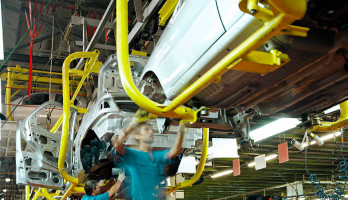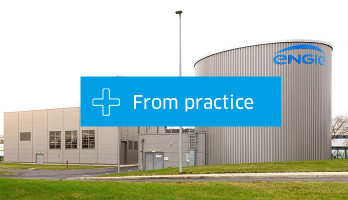
Energy-saving contracting helps boost energy efficiency in buildings
Many buildings and companies still have a high potential for energy savings. A modernization of building and plant technology can make a significant contribution to the achievement of climate objectives. However, various obstacles such as a lack of expertise, a lack of budget or a reluctance to take financial risks often stand in the way of increasing energy efficiency in buildings.
A partnership with a specialized service provider in the context of an energy-saving contract helps to solve this dilemma. The principle: Through guaranteed energy savings, the energy service provider makes an active contribution to the reduction of greenhouse gas emissions, from which all stakeholders and of course the environment benefit.
Building modernization: Renovation and implementation delays hinder energy-efficient solutions
There is considerable potential for energy modernization in the technical building equipment of commercial and industrial buildings, educational institutions and public sector properties to save energy, costs and CO2 emissions.
About one third of the final energy consumption in the building sector is accounted for by the approximately three million non-residential buildings in Germany.
However, these buildings still receive little attention in terms of reducing energy consumption or greenhouse gas emissions. Companies and public institutions are still investing very little in building modernization and energy-efficient solutions. There is either a lack of information about the possibilities, a lack of expertise or even a lack of financial resources. In addition: More efficient building technology is generally not part of the core business and is therefore considered more in a new building than in existing buildings.
Modernization of building technology enables high energy savings
The modernization of building technology requires good and intensive planning, a new design and an investment by the owner. It often enables high energy savings through technological advances and optimized planning. However, the necessary measures are generally outside the normal business activity, so many energy managers and managers are afraid of the necessary effort. Investments are also an obstacle to the modernization of technology. Either the budget is missing or there are high demands for repayment.
Energy-saving contracting as a solution model for building modernization
In order to be able to modernize the plant technology under these conditions, the help of a specialized, external energy service provider is necessary. These service providers, such as ENGIE Deutschland, use the model of energy-saving contracting. As contractors, they plan, finance and implement the energy modernization measures. They guarantee the client the amount of savings over a fixed period - usually between eight to 15 years.
Saving energy costs through guaranteed reduction of energy consumption
Modernizations within the scope of energy-saving contracting can in many cases achieve a reduction in energy consumption of 20 to 30 percent. This reduction is measured against the so-called "baseline", the consumption at the start of the agreement, and must be achieved annually.
The client benefits from the guaranteed savings and can pay the contractor out of the saved costs. This will finance the modernization. Thus, the financial risk lies exclusively with the service provider, who has previously promised the amount of energy savings. If the contractor does not achieve the guaranteed savings, the contractor receives a compensation payment.
Energy-saving contracting has already been tried and tested on the market for decades
The model of energy-saving contracting has been known on the market for about 30 years. The specialists of ENGIE Deutschland have worked in this field for more than 25 years and have a lot of experience and expertise.
Good to know: In addition to the term energy-saving contracting, other terms are also used. The energy-saving contracting describes the same, but with the emphasis on saving. There is also the name performance contracting. Plant contracting, in turn, focuses on the energy supply through a plant, such as CHP or photovoltaic systems, and is another term for energy supply contracting.
Improving the energy efficiency of public buildings with contracting solutions
The poor budgetary situation in many public administrations has created a backlog of renovations over the last few years. For example, in numerous public buildings, an outdated building technology is still used. As a result, higher energy costs have to be paid than necessary. Given the large number of public properties, the potential for energy savings becomes clear. For example, cities and municipalities have around 175,000 non-residential buildings, which cost around four billion euros a year to supply electricity and heat.
Public institutions approach the diverse tasks of climate protection very differently. The implementation of energy efficiency measures is significantly dependent on the human and financial resources available. Often decisions for modernization are only made within the scope of urgently needed repair. However, a concept for comprehensive energy savings is lacking in these cases.
Energy-saving contracting as an attractive model for public institutions
In order to be able to tap into the potential for energy and cost savings through modern building technology in public buildings, it is necessary to involve experts from practice. The financing of measures to increase energy efficiency by private companies, which can at the same time ensure a reduction in energy costs, allows public budgets to be reduced and makes a significant contribution to climate protection.
Increasing the potential for energy efficiency in industry, trade and office buildings
The situation is not much different for commercial buildings. Often, the building technology is only modernized if tenants change or if the use is changed. It must function in everyday life and ensure the operation. The energy costs generally play only a minor role for the operators or owners.
Nevertheless, the importance of these buildings for the final energy consumption in Germany and thus also for climate protection must not be underestimated. For example, the roughly 320,000 office properties and half a million buildings in retail have an energy consumption of 118 terawatt hours per year (Source: dena model project non-residential buildings).
Many companies shy away from financial risks of modernization
Although there are many ways to reduce energy consumption, companies want to take only a small financial risk. The payback period should not exceed one to three years. In addition, the companies often lack an eye for the optimization potential and the technical expertise for plant technology.
Energy-saving contracting decouples modernization of buildings from financial obligations
As in the public building sector, cooperation with a competent partner company specializing in building modernization again helps. The partner takes care of the expert implementation and the achievement of a guaranteed energy saving. At the same time, the technical systems are modernized without affecting the operation. Last but not least, these partner companies can help to minimize the financial risk via energy-saving contracting.
What contribution does energy-saving contracting make to the zero-carbon strategy?
Energy Efficiency Contracting is an effective instrument for reducing greenhouse gas emissions from companies and public properties. It is a model that benefits all parties and protects the climate. The contractor contributes to greater sustainability through lower emissions and benefits from guaranteed energy cost savings without having to invest himself. The contractor's investment is in turn refinanced from the savings achieved. Once the repayment has been completed, the contractor then benefits completely from the reduced energy costs.
ENGIE Deutschland: More than 100 contracting projects already realized
ENGIE Deutschland has been working with this model since 1994 and has implemented 102 projects in various sectors. Investments of 183 million euros are offset by savings of 409 million euros. Among the customers are:
- the head office of the globally active automotive supplier BOS in Stuttgart,
- the Pinakothek der Moderne in Munich,
- the University Hospital Tübingen,
- the computer center of the University of Stuttgart and
- the city of Plochingen with a total of 14 urban properties – from kindergartens and schools to the municipal pool.
Conclusion: Make energy-saving contracting effective across the board
The savings realized by ENGIE Deutschland show the contribution energy-saving contracting can make within the scope of the zero-carbon strategy. Cooperation with administrations and companies in particular offers enormous opportunities for savings in energy costs and CO2 emissions. For this to happen, however, the energy-saving contracting model must also be able to develop its effectiveness on a broad scale. For this very purpose, successful projects carry out valuable educational work in order to familiarize companies and the public sector with energy-saving contracting as an alternative to building modernizations on their own and to convince them of the advantages.
Our Expert











